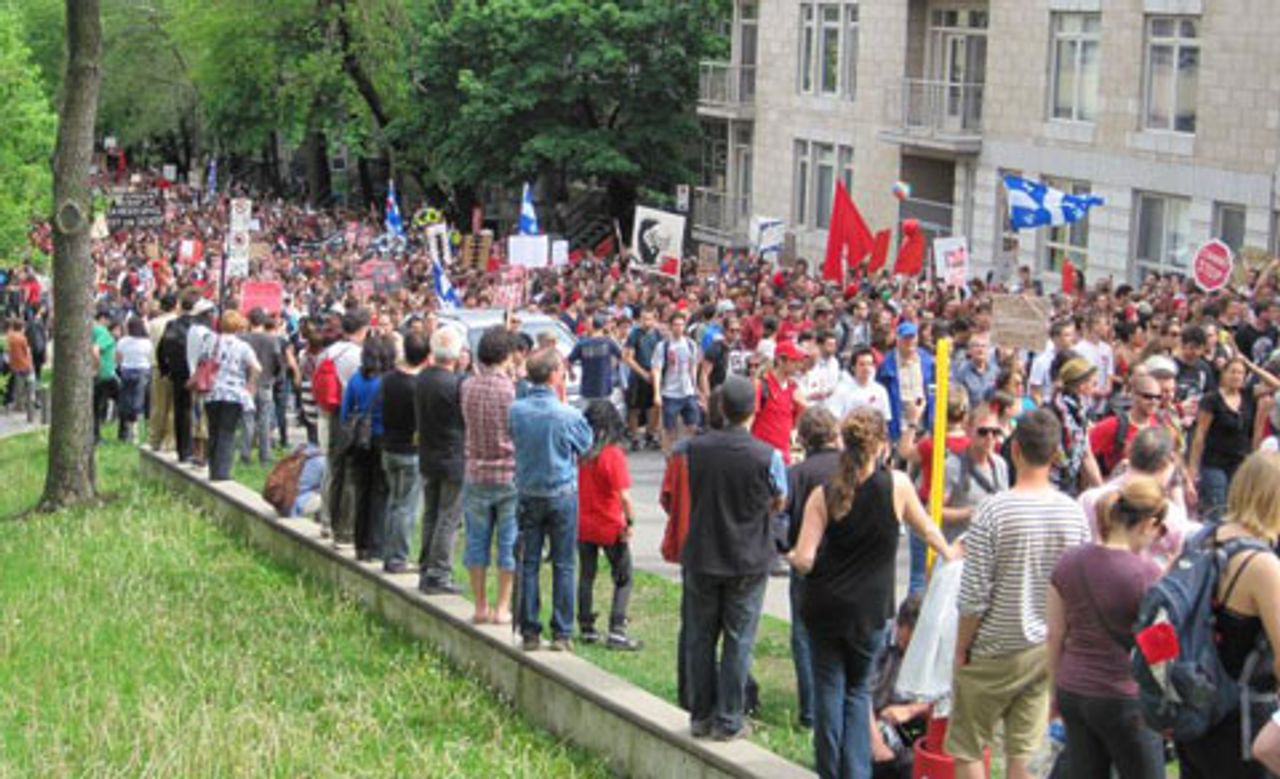 Well over 100,000 people marched through the streets of Montreal on Tuesday to mark the 100th day of the student strike
Well over 100,000 people marched through the streets of Montreal on Tuesday to mark the 100th day of the student strikeQuebec authorities have begun to make use of the sweeping repressive powers contained in Bill 78—the emergency legislation the provincial Liberal government rushed through the National Assembly late last week to suppress the province-wide student strike.
On Tuesday evening, just hours after 150,000 people had demonstrated in Montreal to mark the 100th day of the strike and denounce Bill 78, police invoked the new law to declare a nighttime student protest illegal.
In addition to criminalizing the student strike, Bill 78 makes all demonstrations in Canada’s second most populous province—irrespective of their cause—illegal, unless organizers have submitted to police more than eight hours in advance the protest route and duration and undertaken to abide by any changes demanded by the police.
The organizers of Tuesday’s nocturnal protest, the 29th successive evening demonstration held in downtown Montreal in support of the student strike, had defied the legal requirement that they seek police permission for their demonstration. Citing this failure, the police declared the protest an “illegal assembly,” then used tear-gas and baton charges to disperse the crowd of more than 2,000.
In the melee that followed, 113 people were arrested. According to police none of these arrests were for violating Bill 78 itself. Rather they were for alleged acts of violence committed while resisting the police’s violent dispersal of the protest or for wearing a mask. The same day that Quebec’s provincial government adopted Bill 78, Montreal City Council, also meeting in special session, passed a bylaw that makes it illegal to wear any face covering—including face-paint, a niqab or a scarf—while demonstrating.
Although Montreal police chose on Tuesday night to use Bill 78 only as a pretext for their declaring the protest illegal, they told a press conference yesterday that they may, at a future date, charge the protest organizers with violating the new law.
In Sherbrooke, the city that Quebec Premier Jean Charest represents in the Quebec legislature, police have gone further. On Monday evening they arrested 36 people and charged them under Bill 78’s Article 16 with participating in an unauthorized demonstration. If convicted, the 36 face a minimum fine of $1,000 and could be ordered to pay as much as $5,000.
Tuesday’s massive march in Montreal attests to the widespread support for the students’ struggle against the government’s plans to raise university tuitions by more 80 percent over the next seven years and a groundswell of popular opposition to Bill 78.
Even the corporate media, which has strongly supported the tuition hikes and defended Bill 78 as a necessary measure to quell violence and disorder, was forced to concede Wednesday that far from ending the “social crisis,” the government’s draconian law has exacerbated it.
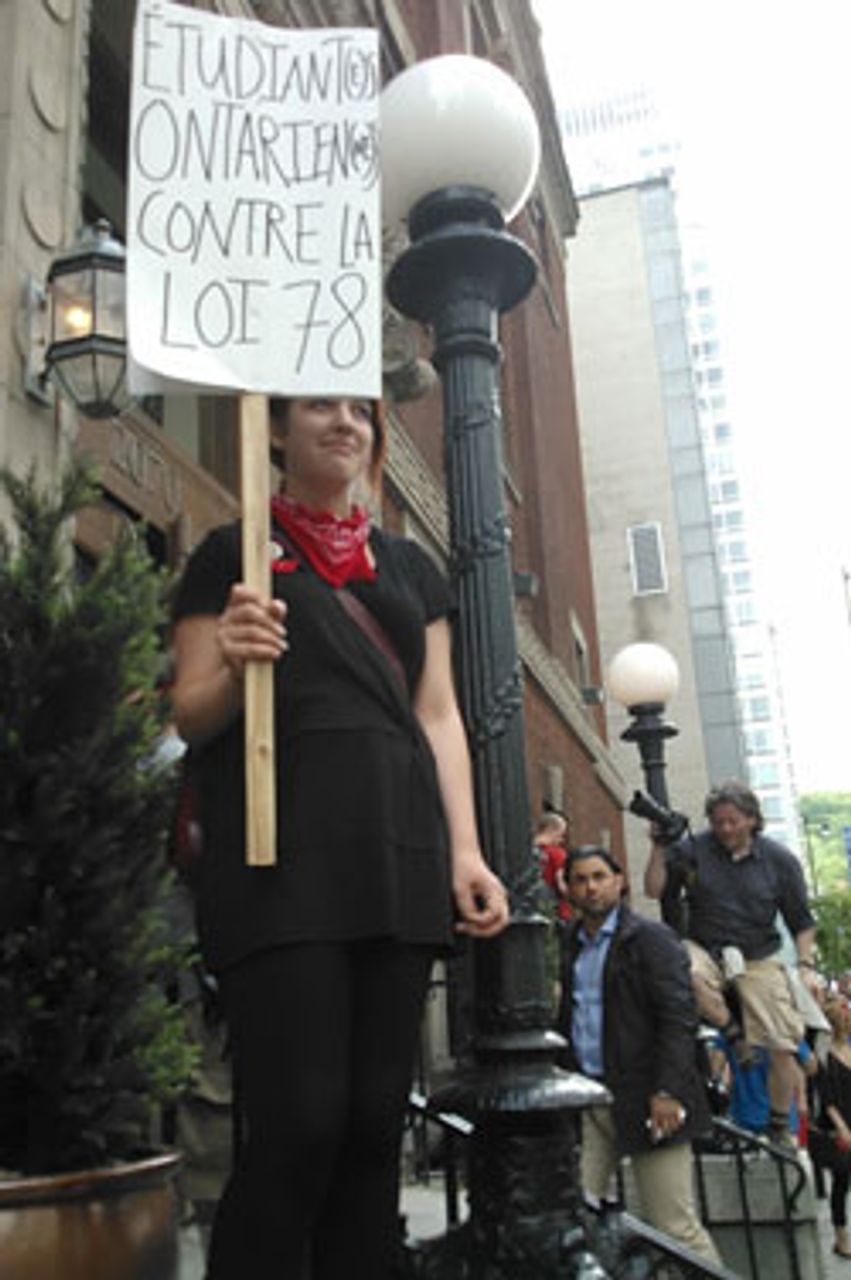 The placard reads: “Ontario student(s)
The placard reads: “Ontario student(s) against Bill 78.”
An opinion poll conducted by one of Quebec’s most respected pollsters found that 78 percent of Quebecers believe the government has “gone too far” and, despite the massive media campaign aimed at depicting the students as violent and selfish, found respondents equally split between those for and against the government’s attempt to legislate against the students. The poll found opposition to Bill 78 concentrated among the young, those with “low revenues,” and residents of Montreal.
Emerging from a cabinet meeting Wednesday, Education Minister Michelle Courchesne said she was ready to meet with leaders of the three province-wide student associations, including representatives of CLASSE (The Broader Coalition of the Association for Student-Union Solidarity), which the government has repeatedly denounced as “extremist,” most recently because it has said it will not submit to Bill 78.
However, even as she proclaimed that the government’s “door is open,” Courchesne made clear that the government remains as determined as ever to force through the tuition fee hikes, which are only an element in its sweeping austerity program. Courchesne explicitly ruled out any discussion of a moratorium or delay in implementing the tuition fee hikes, let alone reducing or rescinding them, and said the government is not prepared to discuss any changes to Bill 78.
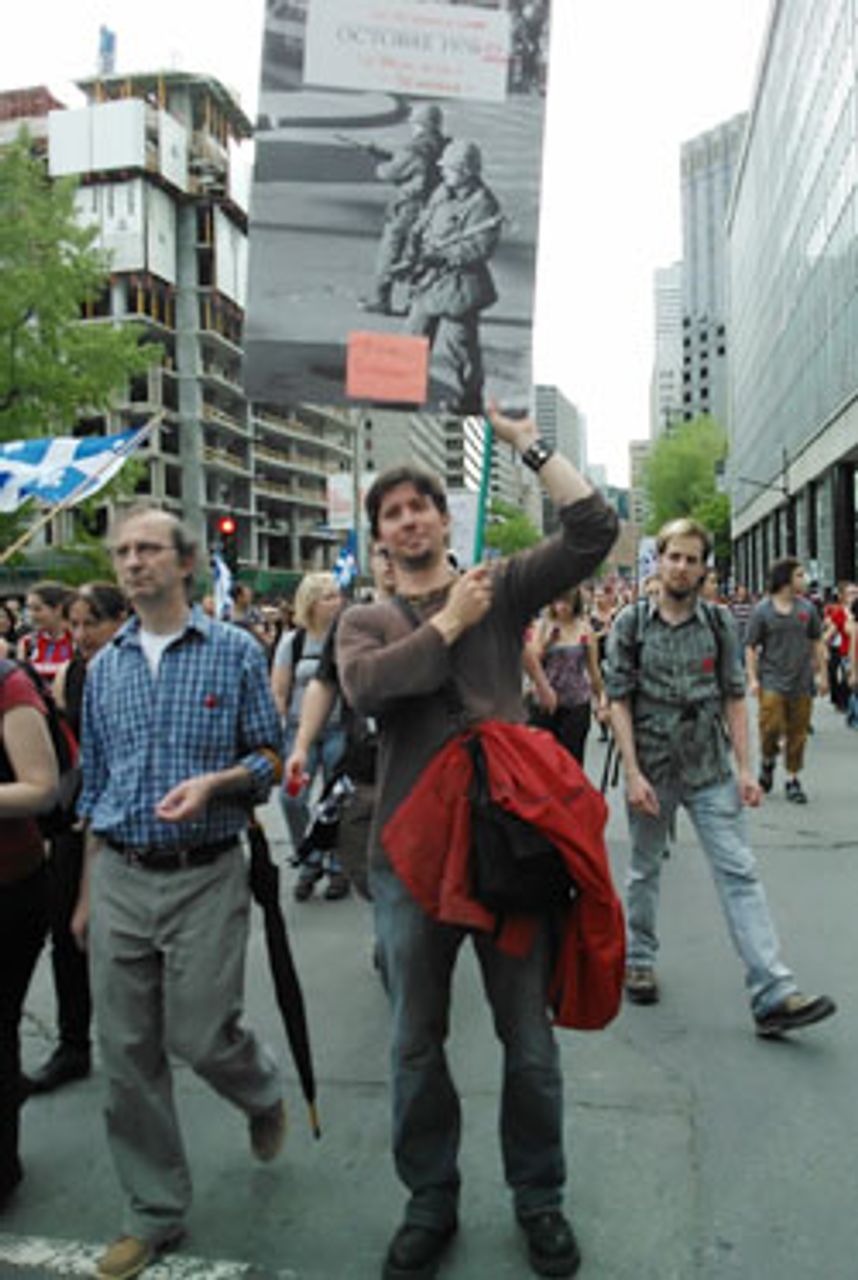 A demonstrator with a placard making allusion
A demonstrator with a placard making allusionto the Trudeau Liberal government's imposition
of the War Measures Act in October, 1970
The leaders of the student associations have nonetheless indicated a willingness to resume talks with the government. Earlier this month, under pressure from the leaders of Quebec’s principal trade unions, they signed on to a sellout agreement that not only called for the implementation of the tuition hikes in full, but also for the establishment of a government/business-dominated tripartite committee under which student leaders would have worked with the government to cut university spending. This agreement subsequently collapsed because of massive student opposition.
While denouncing Bill 78 as an unprecedented attack on democratic rights, the trade unions have announced that they will comply with all its provisions, including those that conscript teachers into the government’s drive to break the student strike. The unions are seeking to use their political and financial influence over the student associations and the student movement to promote their longtime ally the Parti Quebecois (PQ)—a big business party which when it last held power implemented the greatest social spending cuts in Quebec history.
The leaders of Quebec Solidaire (QS), a Quebec nationalist party that presents itself as a leftwing alternative to the PQ, meanwhile, have backed away from statements from their lone member of the Quebec legislature that suggested they were counseling defiance of Bill 78. The comments of Amir Khadir had been vehemently denounced both by the QS’s establishment opponents and by editorialists, who said that those not prepared to uphold the laws adopted by the National Assembly have no right to serve in it. “We cannot encourage defiance of Bill 78,” announced Francoise David, QS’s co-leader Wednesday.
The Quebec students and their supporters must draw far-ranging conclusions from the all-out campaign being mounted against them not only by the Charest Liberal government, but by the Canadian ruling class as a whole. The capitalist elite fear and hate the student strike because it represents an implicit challenge to their class strategy—their drive to make the working class pay for the breakdown of capitalism through austerity measures that aim to destroy all the social benefits working people won through the great social struggles of the last century.
To prevail, the students must make their strike the catalyst for the mobilization of the working class in Quebec and across Canada in an industrial and political offensive against all social spending, job and wage cuts and for a workers’ government.
The World Socialist Web Site spoke with some of those who participated in Tuesday’s mammoth march in Montreal.
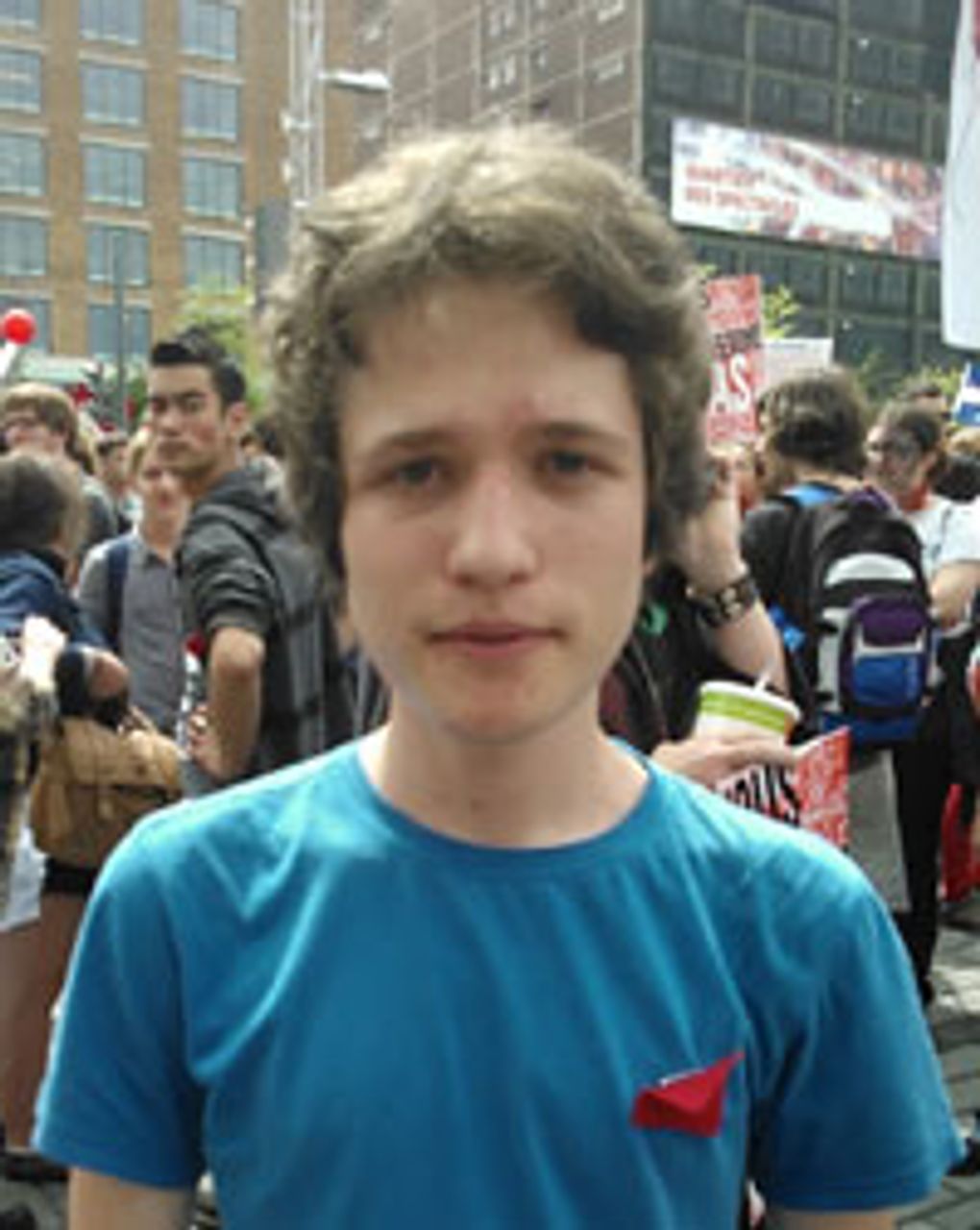 Grade 11 student, Alexis Chartrand
Grade 11 student, Alexis ChartrandAlexis Chartrand is one of the many high school students who have become politically activated by the student strike. He told the WSWS: “The emergency legislation is totally abusive on the government’s part. They cannot pass a law that restricts the fundamental freedoms in the [Canadian and Quebec] Charters [of rights]—it is unthinkable. It’s very dangerous to push through laws in the name of public security. There are lots of fascist, dictatorial regimes that came to power like that. We must be watchful and ensure that public safety not become an excuse to reduce peoples’ freedoms.
“I don’t think that a democratic government can afford to break a popular protest movement with such overt repression. It will eventually have to listen.
“I am fighting for university education to be a right. I think that education, health care and essential public services should be totally free for everyone. This is an elementary egalitarian measure which should be assured in contemporary society. But certainly in a context of crisis, negotiations are necessary and a little give-and-take is required to arrive at some agreement.”
Alexis was aware of the parallels between what is happening in Quebec and Europe. “The more you push people to the limit, the more they will push back and seek to regain what was lost. We see what is happening in Greece and Italy: There are big economic problems and the population is paying heavily for the current economic system. In Quebec, even if we are much less worse off than in Greece, there are still unjust measures—measures that we are beginning to stand up against, so that they do not pass.”
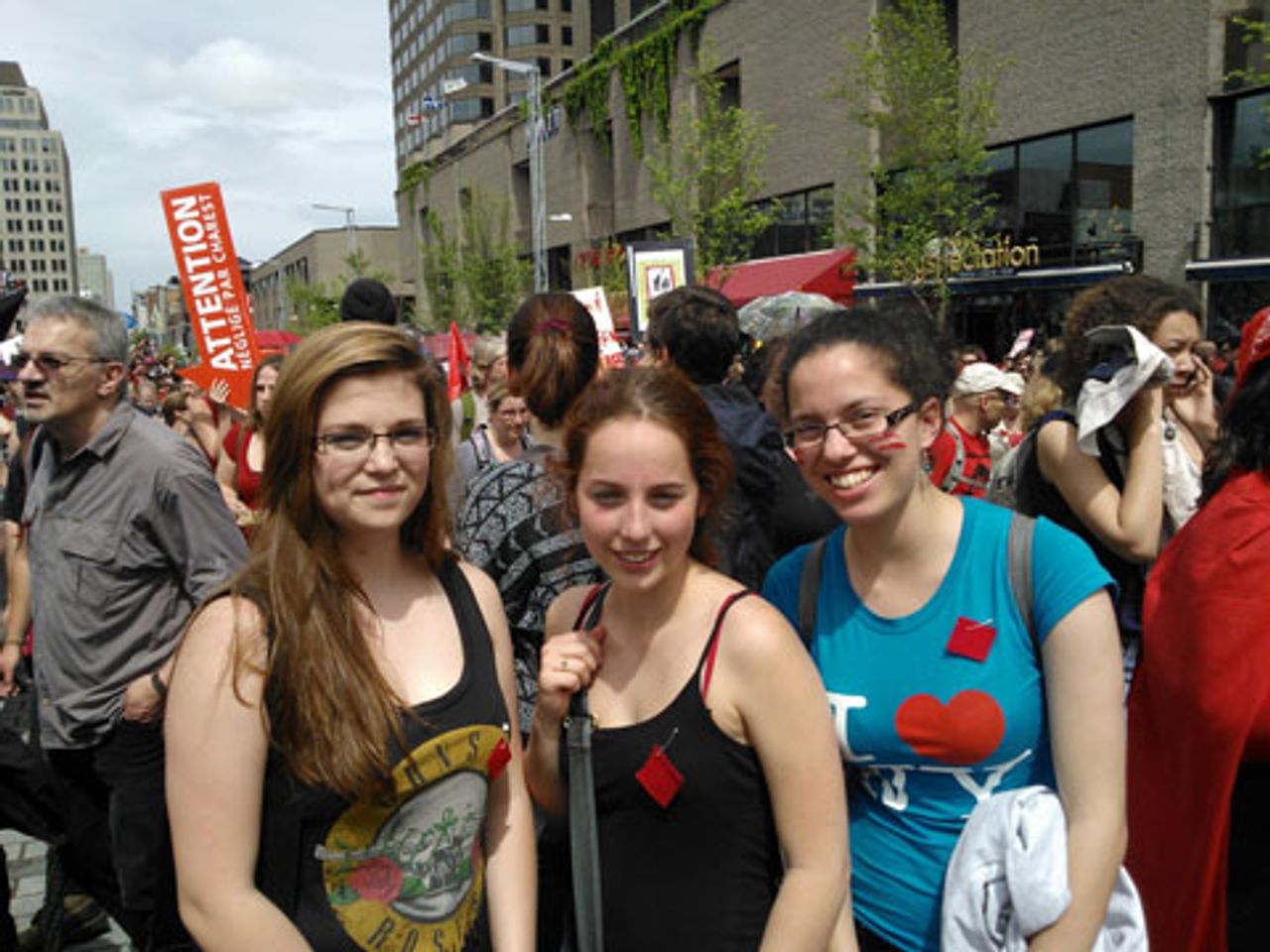 Estelle, Sandrine, and Asma
Estelle, Sandrine, and AsmaEstelle, Sandrine and Asma attend Sophie-Barat Secondary School.
Both Estelle and Sandrine spoke out forcefully against Bill 78. “It’s almost becoming a dictatorship where you don’t have the right to say or do anything,” said Estelle.
Added Sandrine, “I really feel that I’m living under a dictatorship with this law. I do not find it normal that we should feel unsafe in wearing the red squares [the symbol of the student strike] in front of police officers. It is not normal for Quebec to sink to the point where political opinions can be so derided.”
Asked why they thought the government is so intransigent, Sandrine said, “I think that there was pressure from richer people, so that they can avoiding paying their share of what they should pay.”
Asma complained about an opinion poll that had claimed Quebecers massively supported Bill 78. “I believe that polls are biased. La presse’s Thursday poll on the legislation was conducted before details of the Bill were even given. Then we see after the Bill’s passage that people do not agree with it. Whenever I talk to people in the street, most are for the student movement, and not against it. In recent demonstrations, people cheered us on the street.
“The majority of the population is from the middle class and the poor, and if we were to unite to protest against inequality, it would be a much larger movement than the current one protesting the tuition fee increases.”
 Laval University teacher Emil Grigorov
Laval University teacher Emil GrigorovEmil Grigorov a lecturer at the Université Laval in Quebec City, explained that Bill 78 had caused him to come out in the street in support of the students. “This law is a fundamental attack on democratic principles. It is an undemocratic law and recognized to be unconstitutional legislation. It must be stopped.
“I think [the government] is under pressure from big business and that it has reached sort of an impasse. I do not think that it will succeed in breaking the student movement since this is more than a student movement. It's much broader, a social movement, a political movement … a movement for democracy.
“Myself I lived under dictatorship [in Bulgaria]. I spent half of my life under a totalitarian regime, and it always starts with little changes here, small attacks against democracy there, and finishes with the abolition of democracy.”
Receive news and information on the fight against layoffs and budget cuts, and for the right to free, high-quality public education for all.
